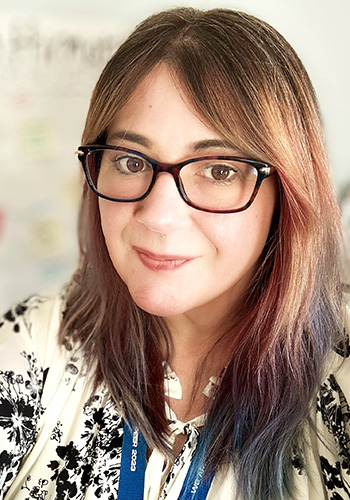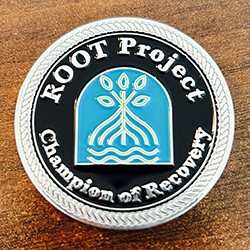Peer Specialist Robyn Hantelman Shines Light on Recovery Outreach

On the fourth anniversary of her recovery journey, Robyn Hantelman bought a cake to share with her coworkers. Now, three years later, celebrations are a tradition at Goochland-Powhatan Community Services (GPCS) where she most recently worked as a peer specialist.

“I think we do an exceptional job of honoring the wins in everybody that we support, and I think that’s why they keep coming back,” she says.
As a certified peer recovery specialist, Hantelman has witnessed multiple people go from receiving support to giving it. She’s one of them.
Hantelman recalls the day she was revived from an opioid overdose in her mother’s home by the first responder crew she once volunteered with. “The last thing I remember was having coffee with my mom,” she says.
Her struggle with addiction began much earlier with a prescription medication for chronic pain. After years of difficulties and months of withdrawal, Hantelman experienced an opioid emergency while visiting Virginia. More months passed before she decided to begin medically assisted recovery. In that up-and-down period, she says she could have died.
“Opioids are powerful,” Hantelman explains. “They can ‘tell you’ that none of that other stuff matters.”
On average, seven Virginians died daily from drug overdose in 2022, according to the Virginia Department of Health. More than 22,300 drug-related emergency department visits were recorded that year.
In just three months on the job at GPCS, Hantelman knew the status quo of recovery outreach was not working in rural Powhatan. Hearing from others who had seen or experienced a substance emergency was of tremendous value in reshaping the program.
“The stuff we’ve been through can actually lead you to a very fulfilling, purposeful life,” she says. “There’s value in our stories.”
Hantelman met with a group of concerned citizens in 2021 to establish the Rural Overdose & Outreach Team (ROOT) Project. The project is a collaboration between GPCS and Emergency Services Solutions, a company that provides emergency medical services. ROOT aims to sow seeds of prevention by providing community education, a safe space for conversation and resources to help grow healthy lifestyles.
Since its founding, Hantelman says the project has reached around 150 individuals and families with naloxone kits and comfort items, such as chamomile tea and worry stones, within hours after a substance emergency. Naloxone is a medication approved by the Food and Drug Administration to rapidly reverse opioid overdose.
“It’s just things that show that somebody cares,” Hantelman says.

ROOT identifies public servants who have provided aid or assistance during a substance emergency. These firefighters, rescue workers and law enforcement officials are given a challenge coin with the ROOT logo and a message of gratitude from the recovery community. The coins also are often used to commemorate milestones in overcoming addiction.
Hantelman hopes that when others see the coins, they will ask about ROOT and embrace its goal of being a resource for those seeking to improve their wellness.
“This is a place where people get better,” she says. “We’re all committed to helping you no matter what path you choose.”
If you or someone you know is facing mental health-related distress or a substance use crisis, call or text the free and confidential 988 Suicide & Crisis Lifeline 24/7 at 988.
Editor's note: At the time of publication, Hantelman announced that she will soon begin a new role as the director of treatment and recovery at Encompass Community Supports, serving the Culpeper area.




